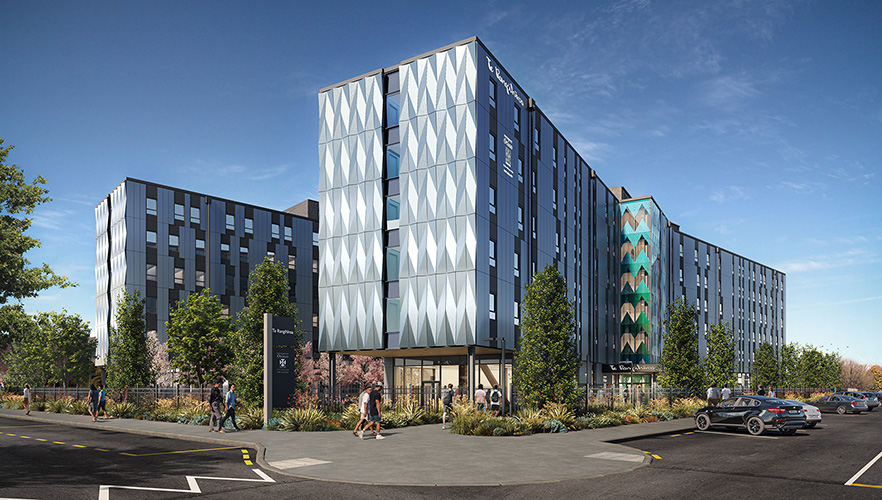
Artist impression of the new Te Rangihiroa College facility.
The University of Otago is building a new 450-bed residential college to meet a forecast increase in student enrolments and respect a gift bequeathed by descendants of a distinguished former student.
The college will be on University-owned land on the corner of Albany and Forth streets and is scheduled to welcome a new cohort of students in 2024.
It will be on seven levels over four wings and will include 125 en-suite rooms, professional college staff accommodation, reception and offices, dining hall and kitchen and multi-functional communal spaces.
The project will boost the University's number of residential beds by 450, enabling Otago to cater for predicted growth in first–year enrolments. The total estimate for design, construction, furnishings and overheads is in the order of NZD$104.7m.
The name Te Rangihīroa and the college's identity will transfer to the new facility.
Descendants of Te Rangihīroa (Sir Peter Buck), the University's first Māori graduate, gifted the use of his name for the existing college which opened in 2014.
The new college will incorporate input from Te Rangihīroa's Ngāti Mutunga iwi and local Kāi Tahu throughout the design process.
Former University of Otago Vice-Chancellor Professor Harlene Hayne said the new college was an opportunity to build on the Te Rangihīroa culture developed by staff and students over the past five years.
“It is important that we respect the taonga gifted to the University by creating a facility that can proudly bear the name of Te Rangihīroa.
“The existing Te Rangi Hīroa (now 192 Castle College) is a popular residential college and we can continue to honour this gift in the new college.”
Former University of Otago Chancellor Dr Royden Somerville QC welcomed the addition of the new college to Otago's residential campus.
“We offer a unique student experience at Otago and for many of our first-years an integral part of that is staying in a residential college.
“Our students have high expectations so our intention is to continue to provide them and our staff with the best possible facilities. This new college will continue that tradition.”
University Chief Operating Officer Stephen Willis said adding beds would future-proof the University as it seeks to match capacity with forecast increases in numbers of New Zealand school leavers. In the short-term the extra capacity will also allow other residential colleges to be upgraded.
The scale of the project reflects the University's continuing commitment to investing in our own residential colleges.
“Otago recognises the value of operating its own residential colleges and running them to the highest possible standards of safety, academic support and pastoral care.”
Like all University of Otago owned and operated colleges, the new Te Rangihiroa will have a team of professional staff living on site, supported by Collegiate Community Leaders (subwardens), administration and reception staff, its own dedicated kitchen and dining room staff, academic tutors and evening security.
All these staff have either primary or secondary roles in pastoral care and student wellbeing.
Medium temperature hot water will provide the main source of heating energy for radiators in the new college. Water from the main town source is heated to 80 degrees Celsius in cylinders belonging to the medium temperature hot water system.
As part of the University of Otago's ongoing sustainability agenda, the new College is intended to achieve a NZ Green Building Council 5-star Green Star rating (NZ Excellence) for the building, encompassing energy efficiency, innovation and sustainability.
The new college will be built on the site of the University's Albany St recording studio which was demolished in 2020.
New recording studios were built as part of the University's NZD$26 million School of Performing Arts and College of Education project in Union St East